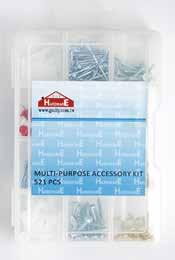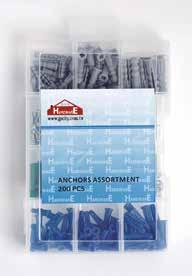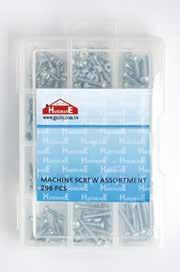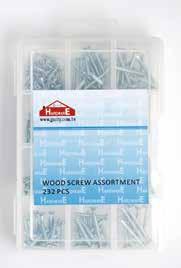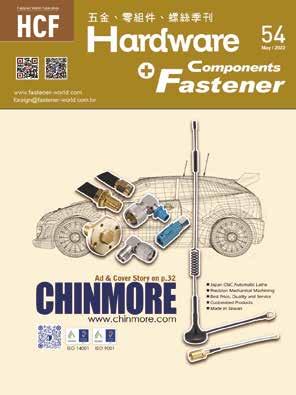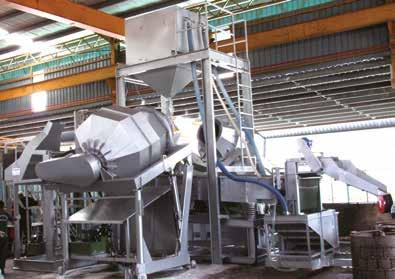






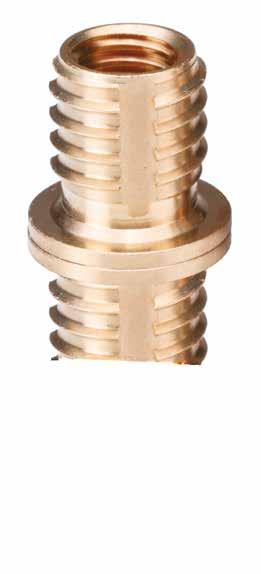
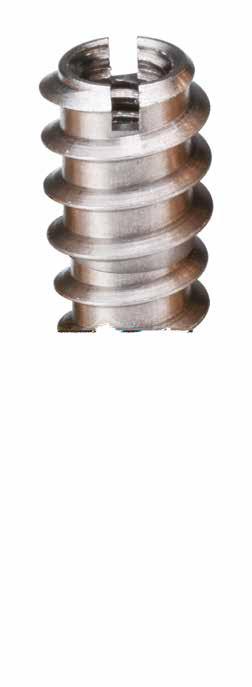






















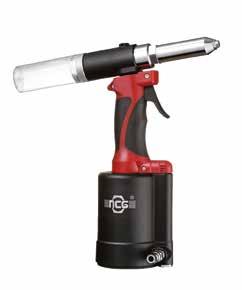













































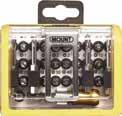





























































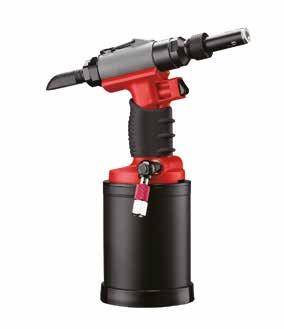

























































































































































































 by Dean Tseng, Fastener World
by Dean Tseng, Fastener World
This is attributed to several of its features including:
1. Fully traceable production management with toplevel QC;
2. Excellent manufacturing technique, experienced customer service staff, market-leading products that are good value for the price;
3. Pursuit of 0 PPM production quality;
4. Certified to ISO 9001 and IATF 16949, two of the major certification systems.
For decades, Chin Tai Sing Precision Manufactory has made achievements in the American and European markets. It supplies standard and customized brass threaded inserts, metallic self-clinching studs and nuts, as well as parts in various materials including stainless steel and aluminum. It has made a reputation and is highly regarded as a top supplier in the global automotive and electronic parts markets.
The company’s monthly capacity reaches 10 million pieces which can cope with the vast order demand from clients all over the world. It can provide RoHS certificates, PPAP documents, and IMDS as well as ISIR reports. The reason that it can create world-class high quality products trusted by clients, is because its production line complies with ISO 9001 and IATF16949 standards, and because it has technicians with over 20 years of experience who can swiftly solve and prevent quality anomalies. Furthermore, the company has advanced visual measuring instruments, optical sorting machines and packing machines to cope with clients’ quality requirements and specific requests.

General Manager Johny Lee said, “Besides, we are the first in the industry to have introduced full traceability in our production process to let clients trace order status with ease. We follow a strict quality policy and we monitor quality for clients from checking materials to the final shipment. We stick to quality and we don’t back off. We apply 0 PPM standard to products purchased by clients. We also ask the same to be applied to related staff, equipment, and service to create price competitiveness and top quality products for clients.”
“It’s either capacity or quality that clients care most about.” The company’s strength has been satisfying high-end clients with high quality and efficiency. Lee stressed that he will continue to develop higher-end precision products with tolerances below ± 0.01 in the future to create higher-end brand values for clients.
Clients’ demand across the global market continues to change, and the company faces head on with new trends and challenges. It will introduce more advanced automated production and inspection equipment, continuing to improve its production efficiency and product yield rate. Chin Tai Sing will lead its experienced technical staff and provide high level customer service, and dedicate itself to becoming the unbreakable support for clients and the industry.











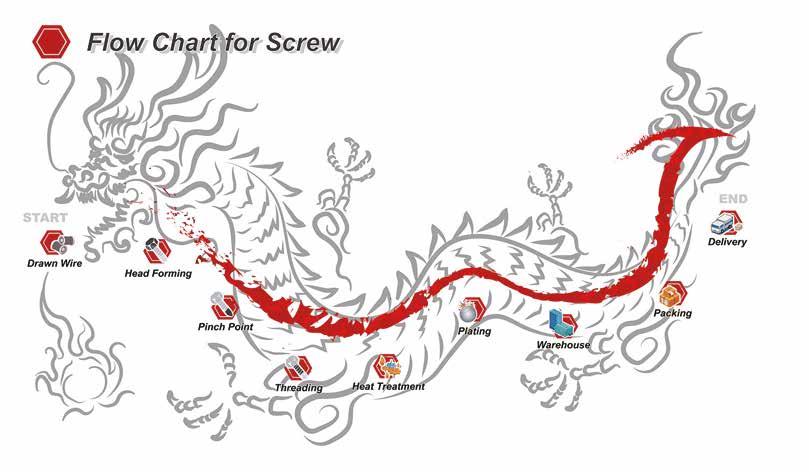







































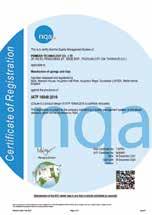




















Paul Candon (United Hardware CEO) has been announced as Vice President of Hardware Association Ireland (HAI). Senan Foley (Glanbia) is the new Honorary Treasurer. At a recent board meeting in Galway of Hardware Association Ireland, President Michael O’Donohoe thanked the board on behalf of outgoing directors Dave Gavin, Mark Lohan, and Sean Moran for all their dedication and contribution to the board of HAI over many years.

Three new directors, each of whom are well known in the sector, were also appointed – Senan Foley (Glanbia), Eddie Kelly (Brooks/Murdocks), and John Peare (DPL). HAI would like to congratulate and thank the new incumbents for coming on board and wishes them well.

Kinsan Fastener News (Japan) reports, the Russia-Ukraine is creating a new economic risk that is pressing against the fastener industry in Japan. The increased prices of materials are reflected in selling prices, but the Japanese fastener companies still find themselves unable to keep up with the frequent material price change. More and more companies as such find themselves shying away from buyers who don’t accept the cost pass-through.
It also becomes problematic that the prices raised on sub-materials are yet to be reflected in product prices. As petroleum price goes up and triggers a higher electricity and utilities cost, it also pushes up the costs for electroplating, heat treatment, oil, packaging materials and tools. In some cases, it costs an extra JPY 20 per kilogram of electroplating. The Japanese fastener makers have been covering the costs of sub-materials because it is their convention not to reflect such costs in product prices, but they are faced with the fact that sub-material price hike is a harsher problem to tackle compared to increased prices of materials. Some of them have ended up closing their business. To the Japanese fastener makers, how they could quickly reflect increased costs in product prices is a crucial factor that hugely impacts their business.
After Nissan and other carmakers
out new EV models and the Jap anese government raised subsidies for car purchase, EV sales in Japan grew a fold to a historic high in the first 6 months of 2022. Nissan marked a market share of 60% and its sales far exceeded that of Tesla.

According to the statistics released by JADA and JMVA, the EV sales in Japan in the first 6 months of 2022 skyrocketed 110% to 17,771 vehicles. This is a new record higher than 15,006 vehicles recorded in 2018.
The Japanese government plans to ban sales of fuel engine vehicles including passenger cars by 2035 and switch to EV, HV, PHV and FCV for all new car sales.













Dali Town (Guangdong China) launched construction of the Global Hardware Parts Purchase Center on June 27. This Center will span an area of 55 thousand square meters with a total investment of RMB 1 billion. It is set to be a supply chain finance service and management center for commerce, trade and exhibition. The construction started in July 2022 and comprises 3 phases. The first phase will be completed within 3 years and all phases will be finished in 6 years. There will be a supply chain management center and a logistics dispatch center attracting high-end logistics talents.

EU announced on June 29 that it has approved a full-range ban of new fossil fuel vehicle sales by 2035 on the European continent. This is aimed at pulling carbon emission down to zero. The proposition was brought to the table in July 2021, and the final determination hints at a total cease of fossil fuel vehicle sales and EU’s full transition into EVs start ing from 2035.
The purpose of this determination is to facilitate the climate target for Europe, which particularly is to reach carbon neutrality by 2050. At the request of countries including Germany and Italy, the 27 EU nations agreed to consider giving the green light to the use of alternative technologies such as plug-in hybrids if they can achieve the complete elimination of greenhouse gas emissions.
Environment ministers meeting in Luxembourg also approved a five-year extension of the exemption from CO 2 obligations granted to so-called “niche” manufacturers, or those producing fewer than 10,000 vehicles per year, until the end of 2035. The clause, sometimes referred to as the “Ferrari amendment”, will benefit luxury brands in particular.
“This is a big challenge for our automotive industry,” acknowledged French Minister of Ecological Transition Agnes Pannier-Runacher, who chaired the meeting. But she said it was a “necessity” in the face of competition from China and the United States, which have bet heavily on electric vehicles seen as the future of the industry.
Bloomberg New Energy Finance (BNEF) released the latest Elec tric Vehicle Outlook that states electric passenger cars sales will grow rapidly in the coming years, from 6.6 million vehicles in 2021 to 21 million in 2025. The fleet of EVs on the road hits 77 million by 2025 and 229 million by 2030, up from 16 million EVs on the road at the end of 2021.
According to BNEF, developed countries and multilateral insti tutions should include electric vehicle investments, incentives and charging infrastructure deployments in their international climate finance plans, making capital available to emerging economies that have credible plans to develop this sector.

The fleet of passenger electric vehicles is set to hit 469 million in 2035 in the Economic Transition Scenario but needs to jump to 612 million by the same date in the Net Zero Scenario. Much of the gap will have to be met in emerging economies, while wealthy countries should look at ways to support the transition in those markets and avoid a global slowdown of adoption.
The Ministry of Commerce of China announced to continue anti-dumping duties for 5 years on partial car bon steel fasteners originated from EU and UK, starting June 29, 2022. The Ministry claimed that if it ceased this anti-dumping measure, the dumping of carbon steel fasteners from EU and UK to China as well as the injury made to the Chinese carbon steel fastener industry would continue or happen again.
June 28, 2010, the Ministry decided to impose an ti-dumping duties (rates from 6.1% to 26.0%) on carbon steel fasteners originated from EU. June 28, 2016, the Ministry decided to continue the anti-dumping duties for 5 years starting June 29, 2016.


The carbon steel fasteners subject to the duties include wood screws, self-tapping screws, screws and bolts with or without nuts or washers (excluding rail screws as well as screws and bolts with a diameter under 6mm), and washers. The scope of the investigation did not include nuts and fasteners used for the maintenance and repair of civil aircraft.
The U.S. Department of Commerce revoked the AD orders on helical spring lock washers from China and Taiwan because no domestic interested party filed an application.

June 28, 1993, Commerce issued an AD order on helical spring lock washers from Taiwan. October 19, 1993, Commerce issued an AD order on helical spring lock washers from China. The U.S. initiated 4 sunset reviews respectively on February 23, 2001, July 3, 2006, December 5, 2011, and May 26, 2017, each prolong ing the duty expiration date. April 1, 2022, Commerce initiated the 5th sunset review investigation on helical spring lock washers from China and Taiwan.

Frugal innovation is the prevalent culture in India. The Indian press reported a local man revamping his car into a helicopter and renting it for weddings. The Indian Tata Group follows suit. Turning away from pouring loads of money into EV development like the American and European carmakers do, Tata manu factures affordable Nexon EVs at the lowest cost and succeeds in becoming the king of Indian EVs.
At first Tata didn’t have the latest automated production line, and production had to rely mostly on human workforce, so Tata was only able to manufacture 8 EVs a day. But when Nexon swept the local market after its rollout, the spike in demand had Tata increase workforce at adjacent plants. Up to this May, Tata’s daily capacity has breached 100 vehicles.
Like turning a car into a helicopter in the most frugal ways possible, Tata did whatever it could to spend the least budget to morph its existing models into EVs and install them with cheaper battery units. That’s how it succeeded in releasing an affordable EV for the Indians. It gave up on investing billions of US dollars in EV production lines— the way that American and European carmakers would do. The frugal and innovative Tata draws a clear line that differentiates itself from market counterparts. Tata is well aware that a cheaper
EV is the clear path to take to make a USD 19 thousand EV that is affordable for the local middle class. Tata’s success is also attributed to the Indian government providing subsidies and imposing a high tax on imported EVs.


Lamons® Manufacturing and Service Com pany, a global leader in safety sealing and at tachment solutions, is pleased to announce it is commemorating its 75th anniversary in 2022.
Founded in 1947 by W.A. Lamons, the company began providing quality gaskets to the oil and gas and petrochemical industries. It acquired Richard Gasket Company in 1985 and Packing & Gasket Engineering (PAGE) in 1988. Lamons then purchased Industrial Bolt and Gasket in Beaumont, Texas in 1997. In 2010, Lamons acquired South Texas Bolt and Fitting, which catapulted the company into being one of the most capable specialty fastener manufacturers in the world. IsoTek was purchased in 2012 and added isolation gaskets, sleeves, and washers to the product
portfolio. With the addition of hoses in 2016, Lamons fulfilled its vision of leading global markets in safety sealing and attachment solutions. In 2019, Lamons became part of the First Reserve family, a leading global private equity investment firm exclusively focused on energy.


“We are extremely proud to reach this milestone – 75 years of innovation in safety sealing and attachment solutions,” said Marc A. Roberts, CEO of Lamons. “Creating a world-class engineering team, investing in long-standing relationships, and never losing sight of the possibilities that tomorrow would bring

the significant reasons we are standing here today.”

Altenloh, Brinck & Co. (ABC) manufacturing and distributing various engineered fasteners (including under the SPAX brand for the construction market) has recently celebrated the official opening of its new Ohio, U.S.-based training center.
Around 14 miles away from the company’s U.S. HQ, the new training facility based in Ohio provides ABC with a dedicated space for important training needs. In 2021 ABC also built a 64,000-square-foot facility in Pioneer, Ohio, which houses all of the company’s fastener packaging operations. ABC has been operating as a family business in Ennepetal, Germany, since its founding in 1823. It now manages companies in Germany, Europe, the U.S. and Australia.
Vossloh, one of the world’s leading providers of products and services related to rail infrastructure, has secured an economically and strategically important contract to deliver rail fastening systems for a new high-speed line in northern Egypt. As commissioned by the end customer, state-owned company National Authority for Tunnels (NAT), the coastal city of El Alamein will be connected to the city of Ain Sokhna, which is located on the Suez Canal. A high-speed line is also planned between El Alamein and Mersa Matruh, which means that the planned double track line will be approximately 660 kilometers long.
Delivery of the rail fastening systems by Vossloh is scheduled to begin already this year, with completion of the project expect ed in the course of 2024. The order, with a volume exceeding €40 million, will be carried out by subsidiary Vossloh Fastening Systems GmbH, which is headquartered in Werdohl.

Egypt plans additional massive investments in its rail network over the next few years, including in particular the establishment of a high-speed network which is to be expanded to over 1,800 km in the future. “The new rail line will be designed for speeds of up to 250 km/h. It will shorten the travel times of millions of people by up to 50 percent while producing more than 70 percent fewer carbon emissions than road traffic. We are delighted to be able to make a substantial contribution to this landmark project in this region,” says Jan Furnivall, Executive Board member of Vossloh AG, adding: “Our extensive experience with the equipment of high-speed lines will allow us to create significant value for our customers.”




Loctite DRI 2250-W offers high temperature resistance of over 200ºC and has excellent chemical resistance. Scott Simmons, Business Development Manager, North America, describes how its superior high temperature resistance addresses customers’ frustrations with competing products: “Traditional products fail to maintain room temperature (RT) breakloose strength and can typically lose around 50 percent – and in some cases even more – of their strength at 150ºC. By contrast, DRI 2250-W maintains RT strength beyond 150ºC
Further advantages of Loctite DRI 2250-W include its low coefficient of friction. Tested on multiple plating surfaces, the material maintains a coefficient of friction between 0.10 – 0.16. It also shows superior performance on all plating types, including the newer zinc-flake coating, with added lubricity.




As a pre-applied film, the threadlocker is dry-to-thetouch and remains an inert coating until assembly. During assembly, microcapsules contained within the coating are crushed and release an active ingredient that initiates the anaerobic curing process. When cured, Loctite DRI 2250W also acts as a thread sealant as well as a threadlocker. It eliminates the need to apply liquid sealants, adhesives, or any other mechanical locking or sealing device to threaded parts during manual or automatic assembly and is flow coatable for higher output speeds.



Stanley Black & Decker announced that its Board of Directors has named Donald Allan, Jr., currently President and Chief Financial Officer, the Company’s next Chief Executive Officer, effective July 1, 2022. Mr. Allan succeeds James M. Loree, who has served as CEO since 2016. Upon assuming his new role, Mr. Allan joins the Board of Directors and retains his title as President. Also, as part of the announcement, the Company has appointed Corbin Walburger to serve as Interim Chief Financial Officer, effective July 1, 2022.
Mr. Allan is a seasoned leader and 23-year veteran of Stanley Black & Decker who has played a key role in the Company’s evolution to become the world’s leading tool company. During his time as President and CFO, he has focused on driving strategic, long-term profitable growth and has overseen the execution and advancement of the Company’s operating model.



Jaime Ramirez, Executive Vice President and President, Tools & Storage, stepped down from his role to pursue opportunities outside of the Company, effective July 22, 2022. Robert Raff, a 20-year Stanley Black & Decker veteran and currently Head of Stanley Outdoor Integration, will be appointed Acting Executive Vice President and President, Tools. Mr. Raff will work closely with Donald Allan, President and CEO of Stanley Black & Decker, to help drive execution of the Company’s strategy focused on the growth of its core businesses.
Robert Raff served as Head of Stanley Outdoor Integration, a role he has held since August 2021. Over the past 20 years, Mr. Raff has served in various leadership roles across Stanley Black & Decker including President, Stanley Security; President, Convergent Security Solutions; President, North America Commercial Global Tools & Storage; President, Hardware and other roles.
The Company has retained Heidrick & Struggles to conduct an internal and external search for a permanent successor to Mr. Ramirez.

The ThreadChecker by Kaman Precision Products is a teachable eddy current inspection tool, widely used for thread detection, plating presence, and absence of heat treatment, as examples. Any physical property difference that relates to material conductivity is readily detected. The ThreadChecker is ideal for use in any automated inspection process in manufacturing.

Consisting of a single electronics module compatible with any probe/ material combination, the ThreadChecker can check threads regardless of part cleanliness, reducing the cost of implementation. It features five internal probes, ranging from 2 to 10 millimeters (mm) and two external probes, 6 mm and 8 mm. Available with a rail mounting option, ThreadChecker is CE-compliant and features IP-67 rated probes and electronics.
Astute Analytica, an analysis company, predicts the global electric tool market scale will reach USD 43.2 billion by 2017 at an annual growth rate of 5.2%. One of the primary contributors is the fact that the global construction industry is increasing use of cordless electric tools and wrenches.

electric tool market can be mainly broken down into North America, Asia Pacific, the Middle East, Africa and South Africa. North America has increased industrial development and infrastructure; and therefore, shares 31% of the global market share as the world’s largest market. Asia Pacific has the fastest growth speed at 6.8% driven by rapid automotive industrial development, and within this region, the fastest growers are China and India.
Klein Tools, for professionals since 1857, introduces the 27-in1 Precision Multi-Bit Screwdrivers, which house all the bits you need for everyday precision driving, plus an integrated 3.5 mm nut driver.

“Saving space in your tool bag is a main priority for trade professionals given how many different tools are often required for any particular job,” says Austin Minor, group product manager at Klein Tools. “The new 27-in-1 Multi-Bit Precision Drivers feature powerful magnets, a stainless-steel barrel, and 27 different driver tips. The tools save space and eliminate the need for carrying cases. Plus, the driver is available in two different models depending on your application needs.”
Adept Fasteners, a privately owned distributor of aerospace fasteners, announces the acquisition of Innovative Tooling Services to strengthen Adept’s position in the market as a leader in aerospace fastener solutions. Innovative Tooling Services, founded in 1986, provides the aerospace industry with tools and tool repair.

“Together, we can transform the way we support our customers’ fasteners requirements by offering tooling solutions for fastener removal and installation across all fastener product types,” said Gary Young, President of Adept Fasteners.
“We’re excited to be a part of the Adept Fasteners team,” said Mark Wylie, President of Innovative Tooling Services. “This new relationship represents an excellent strategic fit that enhances the value we deliver to our customers.”
Innovative Tooling Services will continue to serve customers from their office and repair center in Grand Prairie, Texas.




















Wisconsin, U.S.-based Endries International announced that it has acquired Store Room Fasteners, which is based in Alabama. Financial terms were not disclosed. Since it was founded by Tim Wilsford in 1984, Store Room has emphasized meeting the needs of OEMs and industrial businesses for almost 4 decades. Currently, Store Room has facilities in Montgomery, Opelika, and Selma, as well as sites in Lagrange (Georgia) and Nuevo Laredo (Mexico).
After the acquisition, Store Room will continue to operate on its current ERP system as Store Room Fasteners, an Endries International Company. Tim Wilsford will also remain with the company in a leadership position over the 60 dedicated associates. “Tim has built an organization that mirrors what Endries was and is. We look forward to working with our new team members to improve our overall marketing offerings, said Endries President Steve Endries.


The transaction between the SFS Group and Hoffmann SE that was announced on December 22, 2021 was completed on May 11, 2022, meaning that Hoffmann has now been officially incorporated into the SFS organization. This joining of forces marks a milestone and the companies’ complementary positioning opens up attractive development opportunities for both.
With all the formal conditions having been met, the transaction between SFS and Hoffmann was completed on May 11. One of the key legal requirements that had to be met in order to complete the transaction was the approval of the competition authorities in five different countries – this has now been granted.


PrimeSource Brands (“PrimeSource” or the “Company”), a North American provider of specialty branded residential building products backed by Clearlake Capital Group, L.P. (“Clearlake”), announced that it has acquired Axxis, LLC (“Axxis”), a provider of fastening tools and collated fasteners. The transaction is PrimeSource’s fourth acquisition during Clearlake’s ownership. Financial terms were not disclosed.
Axxis, which goes to market under the Complete and KlinchPak brands, primarily serves STAFDA distribution and packaging houses. The combination with Axxis further enhances PrimeSource’s portfolio of branded fasteners and related fastening tools. Carl Schneider, CEO of Axxis, will remain involved as part of the PrimeSource team focused on accelerating Axxis’ growth.





















































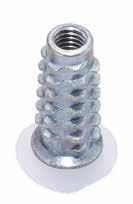











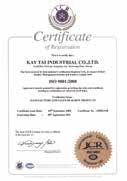
Power tools are hand-held tools, generally powered by electric motors either directly from the mains or from mainsrechargeable batteries. These include drills, saws, sanders and other specialist tools such as hot-air guns (for drying, stripping) and routers (for cutting grooves). The growth in cordless tools is rapid. In terms of industrial demand, generally speaking, the products are applied in the following market segments: Households (DIY) and Professionals (e.g. carpenters, plumbers). They fall within the category of HS Code 8467.
In 2021, the size of the European market for power tools was estimated at just under 12.4 billion U.S. dollars. By 2027, the power tool market in this region is projected to reach 15.5 billion U.S. dollars.

The European exported power tools have shown growth since 2017, except for 2019 (even in the pandemic period, this category has grown). See the right table.
The same story for European imported power tool sector has been also shown in the right table.
Given these statistics, the following question may arise: What is USD 17.45 billion imports for a market of USD 12.4 billion? Let me clarify the answer
over the world, of which USD 1.17 billion are from EU

import
export in the European Union is within
words,










In 2022 the numbers are as below.
Based on the trend of imported numbers in the first 3 months of 2022, it is predictable that the value of imported power tools to the EU will be over USD 17.86 billion in 2022.
NOV. 2021 DEC. 2021 JAN. 2022 FEB. 2022 MAR. 2022
EU Import 1,485,076 1,384,142 1,504,117 1,398,016 1,564,750
Growth -7%
In terms of European exported power tools, the value of USD 12.6 billion is predictable for 2022.
NOV. 2021 DEC. 2021 JAN. 2022 FEB. 2022 MAR. 2022
EU Export 1,061,457 873,544 952,013 1,053,312 1,147,250

Growth -18%
Germany: Germany with a population of 83.2 million is the 16th freest economy in 2022. Its GDP is USD 4.5 trillion and its GDP per capita is USD 54,076. It is the biggest exporter of power tools in the EU. Its export value in this sector is USD 3.81 billion, representing 31% of the whole EU exported power tool value. The main buyers of German power tools are France (16.7%), USA (8.7%), the Netherlands (8.3%), Austria (7.4%), and Poland (7.3%).
Belgium: Belgium with a population of 11.6 million is the 37th freest economy in 2022. Its GDP is USD 588.8 billion and its GDP per capita is USD 51,096. It is the 2nd biggest exporter of power tools in the EU. Its export value in this sector is USD 995 million, representing 8.1% of the whole EU exported power tool value. The main buyers of Belgian power tools are France (16.0%), Germany (15.2%), Poland (10.9%) and the Netherlands (9.5%).
Austria: Austria with a population of 8.9 million is the 22nd freest economy in 2022. Its GDP is USD 491.5 billion and its GDP per capita is USD 55,218. It is the 3rd biggest exporter of power tools in the EU. Its export value in this sector is USD 857 million, representing 7.0% of the whole EU exported power tool value. The main buyers of Austrian power tools are France (21.8%) and Germany (19.0%).
Sweden: Sweden with a population of 10.4 million is the 11th freest economy in 2022. Its GDP is USD 562.0 billion and its GDP per capita is USD 54,146. It is the 4th biggest exporter of power tools in the EU. Its export value in this sector is USD 818 million, representing 6.7% of the whole EU exported power tool value. The main buyers of Swedish power tools are Germany (15.6%), USA (13.3%), Norway (12.8%) and Belgium (12.2%).
Romania: Romania with a population of 19.3 million is the 47th freest economy in 2022. Its GDP is USD 589.7 billion and its GDP per capita is USD 30,526. It is the 5th biggest exporter of power tools in the EU. Its export value in this sector is USD 818 million, representing 6.7% of the whole EU exported power tool value. The main buyers of Romanian power tools are Germany (17.4%) and UK (11.9%).
Germany: Germany has 17.5% of the whole European market of imported power tools. The main exporters to the German market are China (47.7%) and Hungary (7.7%).
France: France with a population of 67.4 million is the 52nd freest economy in 2022. Its GDP is USD 3.0 trillion and its GDP per capita is USD 46,062. France has 10.7% of the whole European market of imported power tools. The main exporters to the French market are China (40%), Germany (19.8%) and Austria (8.0%)
UK: UK with a population of 67.2 million is the 24th freest economy in 2022. Its GDP is USD 3.0 trillion and its GDP per capita is USD 44,117. UK has 8.5% of the whole European market of imported power tools. The main exporters to the UK market are China (54.7%) and Germany (9.6%).
Belgium: Belgium has 7.4% of the whole European market of imported power tools. The main exporters to Belgium are China (32.9%), Sweden (16.3%) and Germany (11.7%).
The Netherlands: The Netherlands with a population of 17.4 million is the 8th freest economy in 2022. Its GDP is USD 1.0 trillion and its GDP per capita is USD 57,534. The Netherlands has 6.4% of the whole market of imported power tools. The main exporters to the Netherlands are China (43.5%), Germany (20.6%) and Belgium (7.7%).



freest economy in
of USD 20.9 trillion.
billion
has a population of
GDP per capita is USD
of unemployment is 8.3%. In 2021
direct investment.
Hand tools are used in the construction, automotive, aerospace, construction, and DIY sectors for various applications including drilling, hammering, sawing, etc. The professional assembly or repair market is larger and the future potential is greater. Professionals use hand tools more frequently than DIY users, and have continuous demand, and are more likely to purchase value-added hand tools.
The value of U.S. hand tool manufacturing was USD 7.95 billion in 2021 and it will reach USD 7.90 billion in 2022, which means 0.5 percent lower than last year. However, the U.S. hand tool market has grown annually with a rate of 2.9% between 2017-2022. The U.S. has always been a major exporter of hand tools in the world .2

In 2021, the export value was as high as USD 4.74 billion. The value of imported hand tools was USD 12.35 billion. It is predictable that the exported hand tool value may increase to USD 4.9 billion by the end of 2022. The following table shows the statistics of exported hand tools from the U.S to the world. Two countries were the main markets for U.S hand tools. They bought 47% of the whole U.S. exported hand tools, which were Canada (with a 30% share) and Mexico (with a 17% share3).
In terms of the imported value, the number should be USD 13.2 billion. The following table shows the statistics of imported hand tools by the U.S from the world. Four countries were the main hand tool suppliers to the U.S market and they allocated 58% of the whole U.S. imported hand tools, which were: China (with a 31.2% share), Taiwan (with a 10.5% share), Germany (with a 9.0% share) and Japan (with a 7.3% share).


Imported Hand Tools to the U.S. from the World Unit: 1,000 USD
Exporters Sep. 2021 Oct. 2021 Nov. 2021 Dec. 2021 Jan. 2022 Feb. 2022 Mar. 2022 Apr. 2022
World 1,074,579 1,097,607 1,052,835 1,106,469 1,088,746 1,036,441 1,182,766 1,079,233
China 383,234 404,319 404,552 399,459 440,107 376,710 382,554 336,213
Taiwan 113,457 137,009 103,902 116,724 107,791 123,513 140,797 112,860
Germany 82,618 98,622 83,439 84,737 81,611 84,474 105,833 97,499
Japan 83,887 77,071 80,522 71,140 63,531 71,346 93,459 78,427
Due to the growing demand in various industrial sectors such as aerospace, defence, automotive, and other industries, metal cutting tools are expected to have the highest compound annual growth rate during the forecast period. Increasing investment in construction and infrastructure development activities is driving the demand for metal cutting tools.
The construction industry in the U.S. is expected to grow steadily over the next four years. The growth momentum is expected to continue over the forecast period, recording a CAGR of 5.0% during 2022-2026. The construction output in the country is expected to reach USD 1,650,159.2 million by 2026.4
The US aerospace and defence market was USD 427 billion in 2021; it will be USD 436 billion in 2022 and by a CAGR of around 2.37% during the forecast period (2021-2030) it will pass USD 550 billion.5
Car production in the U.S. decreased to 1.83 million units in May 2022 from 1.84 million units in April 2022. Car production in the U.S. is expected to be 1.85 million units by July 2022, according to Trading Economics global expectations. Monthly US car production is projected to trend around 2.70 million units in 2023 and 2.80 million units in 2024.6
The value of DIY tools in the U.S. was USD 543 million in 2021, which may grow 3.3% in 2022. Therefore, its value should be USD 562 million. U.S. DIY market is expected to grow at a CAGR of 3.4% between 2022 to 2028.7
The gradual increase in consumer spending power, coupled with market factors such as technological advancement, has led to rapid changes in consumer tier habits, and the US hardware consumption channel has expanded from the previous print media to digital channels. The consumption power of the new generation in hardware and repair products is gradually expanding. The millennial generation has reached the age of raising children in the family. This consumer group is locked in as the main target audience. The reason is that the millennial generation prefers buying old houses and their acceptance of DIY is above the average; nearly 90% have been involved in DIY at home. Not only is it limited to home repairs, but they also like to remodel their living space by themselves, pursuing good prices, product features, and product stability. Price is still the main consideration factor when buying hardware products, followed by product-related information. In addition, data show that 92% of hardware repair users will search through the Internet to compare prices and products before buying. More than 30% of consumers will buy directly online, and nearly 50% of consumers will use the Internet to search and compare, and then go to physical stores to buy. The contribution of innovation is also quite high in the market, and the emergence of new designs is expected to increase the commercial potential of hand tools. This will help the manual tool market show sustainable growth during the forecast period.
4. https://www.globenewswire.com/news-release/2022/02/22/2389055/28124/en/United-States-Construction-Industry-is-Forecast-to-Grow-by-8-8-to-Reach-USD-1-355-097million-in-2022-Despite-Near-Term-Challenges.html#:~:text=The%20construction%20industry%20in%20United%20States%20is%20expected%20to%20grow,USD%20 1%2C650%2C159.2%20million%20by%202026.
5. https://www.mordorintelligence.com/industry-reports/us-aerospace-and-defense-market
https://tradingeconomics.com/united-states/car-production
https://techbullion.com/sales-of-hitter-based-hand-tools-between-2022-and-2028-will-grow-at-3-4-cagr-future-market-insights-inc/
https://www.market-prospects.com/articles/us-hand-tools-market

Tapered roller bearings (Fig. 1) have tapered bearing tracks on the inner and outer rings like rolling elements use the cones. They are suitable for carrying combined loads i.e. simultaneously acting radial and axial loads. They are used mostly in cars as automotive wheel bearings and are commonly used for moderate speed, heavy duty applications where durability is required. Common real world applications are in agriculture, construction and mining equipment, sports robot combat, axle systems, gear boxes, engine motors and reducers, propeller shafts, railroad axle-boxes, differential, wind turbines, etc.
Single row tapered roller bearings are usually set against the second taper. By setting the preload, it is possible to achieve a tight fit (ISO 355).
Unlike others, the tapered roller bearings are detachable and must therefore be held together by the so-called KM-nut 1 and secured by the cage 2 (Fig. 2). By turning (tightening) the KM nut, the necessary preload of the tapered roller bearing 3 is created at the same time.
At first glance (Fig. 2), this is a complicated system that does not guarantee a constant bearing preload. Even from a logistics and assembly point of view, it is not advantageous. And this is an opportunity to optimize the KM nut and thus the entire structural unit.
As can be seen from Fig. 3 , one of the possible solutions is to provide KM nut with an IL locking system, well known locking classical nuts. This system makes it possible to eliminate the unreliable and redundant security cage (see Fig. 2). The main advantage of this system - exact assembly and solid resistance of nuts against vibrations - is also supported by simplified logistics because the retaining ring is firmly integrated with the nut. In addition, the retaining ring can be easily replaced with a new one if required.
Fig. 3 (1 - KM nut with locking system


IL, 2 - Tapered roller bearing, 3 - Spindle)
Of course, tightening tools are also important. As shown in the pictures 4a (classic system SKF) and 4b (an innovative form), the classic tightening of the original KM nut can be replaced by a so-called double-spanner, relying on the constant hardened material and on the length of the arms. In this way, nearly constant preload values are achieved, which is an important factor in their service life.
Fig. 1
Fig. 2 (1 - KM nut, 2 - Cage, 3 - Tapered roller bearing, 4 - Spindle)



Manual tightening cannot guarantee this condition. As shown in Fig. 5, relying on manual dexterity seldom hits the right values. In addition, it shows a relatively large variance of values.

The presented article confirms that even rolling bearings cannot do without threaded joints. KM nuts are not the only case in this regard. Not by chance the world-famous bearing company SKF has published elsewhere, for example, the results of its own study on the most common causes of failure of screw spokes. The question is why was this bearing manufacturer so interested in screws to such detail? The answer is because in many cases, screws are an indispensable piece of equipment for mounting rotating components.
Fig. 4b
Fig. 4a
Fig. 5



There are around 1.68 billion units of cars in the world. Cars consume a great deal of fossil energy. They not only require strength and a long service life, but also have to be up to par in terms of performance, appearance, safety, price, environmental protection, and energy saving. Out of all the constituents of a car, steel accounts for 80%, aluminum alloy for 3%, and rubber/plastic/ resin for 4%. Since the oil crisis, carmakers have had increased attention to lightweight materials and have been using them to cope with net zero carbon emission. Governments across countries including EU, the U.S., China and Japan have stipulated to reduce vehicle carbon emission to decrease environmental impact. EU set the bar at 130 grams of carbon emission per kilometer drive in 2015. In 2021 it was 40% less than 2007’s par which was below 95 grams per kilometer. The U.S. requires that passenger cars’ emis sion per kilometer should be lower than 2021’s standard by 2024.
Compared with 20 years ago, cars are 20% to 26% lighter. On average, the use of the following automotive materials have de creased: steel (down by 15%), cast iron (29%), copper (13%), glass (13%); the automotive materials with increased use are: aluminum alloy (31%), magnesium alloy (100%), powder metallurgy (20%), rubber and plastic (29%). The need to reuse, reduce and recycle automotive components increases their recyclability and reusabili ty. Lightweight materials have higher recyclability and advantages. The increased proportion of lightweight materials used on cars could start the innovation of next-generation automotive compo nents. Every 10% of weight taken away from a car can improve fuel efficiency by 6% to 8%. 1% of weight reduction can bring down oil consumption by 0.7%. 100kg less weight can save 0.3 to 0.6 liter of fuel per 100 kilometers.
Automotive lightweighting can be attained in 3 ways. One of them is replacing materials and using lightweight materials such as light alloy, rubber and plastic, or high tensile steel plates to replace conventional steel plate materials. An example is Honda replacing average carbon steel plates for N-BOX with high tensile steel plates. The new car model is 82 kilograms lighter than models using conventional steel plates. Furthermore, some
by James Hsiaocarmakers increase the use of aluminum alloy or CFRP, or multimaterials. The second approach is to optimize car structures by downsizing engines or electric motors, or changing material thickness. The third approach is to improve the manufacturing process through manufacturing methods (slim manufacturing) or any fastening methods to achieve automotive lightweighting.
The R&D of electric and new energy vehicles have been relentless, but tasks still remain for industrial development, and these include unresolved problems with charging stations, battery reliability and endurance. These vehicles have not popularized in a short term. The ways to reduce EV’s and conventional vehicles’ energy consumption are: downsizing engines through turbo compressor, improving engine and electric motor efficiency, reducing drag during driving, improving transmission efficiency, and reducing EV weight. EV weight reduction is particularly easy to implement. Rubber, plastic, lightweight alloy and composite materials will play an important role in automotive components. The use of steel, alloy, rubber and plastic will increase for automotive component fastening. Unlike spot welding, automotive components are mostly fastened with rivets or screws. This is not economical in terms of weight and productivity, and therefore, it brings about the development and application of various fastening technologies.
Automotive component bonding refers to bonding materials of different characteristics. It usually comes in 3 types which are metallurgical bonding, mechanical bonding and chemical bonding, as shown in Table 1. Each has its own strength and drawback. Currently, the common one is spot welding, which is more productive and cost effective, but likely to concentrate stress on components. It is not necessarily the best bonding method now that lightweight alternative materials are introduced and applied. High tensile steel plate bonding, for instance, uses different amount of pressing and spot welding electric current from those of aluminum alloy bonding. Additionally, the melting
point of steel plates is different from that of resin materials such as rubber and plastic, and it is also different from connecting metals with non-metals in terms of the conditions of bonding. Even with connecting different materials, it could create intermetallic compounds and affect component strength and durability, so it is critical to develop the technologies for automotive component bonding.
Connect two metal plates with elec trode bars for spot welding, while pressing and applying currents.

Fasten components chemically and/or physically with the use of adhesives

Stiffness; Insulation
Source: Industrial Technology Research Institute (ITRI), July 2022
Connecting automotive components is no easy task. Its process requires considering bonding strength as well as the decline of bonding strength between materials due to electrocorrosion or thermal expansion coefficient. This might require adding an insulating layer. Additionally, temperatures have different effects on automotive components; and therefore, the expansion and contraction rate and deformation vary, which should be taken into account as appropriate. An example is considering using adhesives after mechanical bonding.
Depending on the materials for lightweight aluminum alloy car body and the locations that use components, the bonding methods for steel, aluminum alloy and carbon fiber reinforced composite are different. The common automotive component bonding methods include self-piercing riveting, flow drill screw, friction stir welding, cold metal transfer welding, laser welding and metal bonding.
Automotive components come in numerous types. Cars are going lightweight to cope with the demand for customizing and mass-producing nextgeneration and electric vehicles. The use of heterogeneous materials and composite materials increases. Component bonding differs from conventional welding and riveting. Heterogeneous material bonding technologies are being developed and applied. Considering car service life and safety, components need to be endurable through time, and component bonding is moving toward high efficiency and reliability.
Hardening time; Function check
Metallurgical Bonding Metal spot welding Productive; Low cost Prone to stress concentration Mechanical Bonding Screw fastening or riveting Connect components using screws or rivets Bonding Strength; Appearance Weight; Cost Chemical Bonding Adhesive
The Bahco BCL23 are powerful electric secateurs for pruning trees, which are particularly convincing due to their sophisticated ergonomics. Equipped with a carrying strap system, they protect the user from fatigue. The compact design ensures good freedom of movement and reduces the number of blind spots in which dirt can accumulate. This facilitates the maintenance of the device. The minimalist and contemporary appearance demonstrates that the secateurs are also well thought out from an aesthetic point of view.
Manufacturer: SNA EUROPE
The focus of the BLACK+DECKER reviva range is on the environmental aspect. Seeking to create colours, textures and clear forms, as well as optimise the ergonomics and maintain a focus on the environmental impact, the design and manufacturing processes were updated to utilise environmentally-friendly plastics and reduce the consumption of materials. The question of how components can be returned to the material cycle was also taken into account. Thus, both the ideas of solder joints, which are difficult to disassemble at end of life, and elastomer overmoulds, typically found on power tools, were abandoned.
Manufacturer: STANLEY BLACK & DECKER
TOUGH SERIES is a tool series designed for harsh conditions on construction sites. It comprises hammers, screwdrivers and tape measures, which are characterised by a variety of detailed innovations. For example, the patented material of the handles increases the durability of the hammers and reduces material fatigue. A novel design makes it possible to increase their strike force while reducing their weight. The new claw of the demolition hammer simplifies prying work. The magnetic precision tips of the anti-corrosion coated screwdrivers and the long reach of the robust tape measures are further features of successful functionality.
Manufacturer: STANLEY BLACK & DECKER




This tool is a compact precision magazine screwdriver with plastic handle that contains the most common 4 mm double-ended bits. The product is intended for delicate, filigree screwdriving work and is suitable for mobile use. The rotatable cap ensures that work can be carried out easily and well with the tool. A rotatable pull-out magazine ensures that the required bits can be found quickly and locks securely back into place with a clearly audible click.
Manufacturer: Adolf Würth GmbH & Co. KG
The KRASO DKM is made from glass fibre reinforced high-performance plastic. This means its colour can easily be adapted to company or product colours. A low-wear slip clutch limits torque and contact force over multiple assembly processes. Thanks to a specially developed slip clutch, it can be loosened and tightened again without any special tools. An audible and tactile signal indicates when the optimum torque has been reached.
Manufacturer: KRASO GmbH & Co. KG

When designing the Titan 18V combi drill, the focus was on functions that are essential for DIY work. In addition, special care was given to the ergonomics and weight balance of the tool, making it intuitive and comfortable to use over long periods of time, regardless of the operator’s physical ability. Also visually, the tool was designed to emphasise its performance and to convey confidence in the user.
Manufacturer: Kingfisher International Products LimitedThe DuoXpand frame fixing range is suitable for a variety of applications. The special lamella geometry expands gently in the respective building material and thus avoids fractures in porous building materials, which enables anchoring close to the edge. The grey nylon main body provides strength while the red material component provides flexibility and the necessary spread. For timesaving installation, the safety screws matched to the plug are pre-mounted.
Manufacturer: fischerwerke GmbH & Co. KG
Working in confined spaces makes it difficult for an installer to press a button to adjust pliers. This design provides the solution. Work is so much faster and easier when you set the required width across flats directly on the workpiece without needing to press a button. This also means that access to tight workspaces is noticeably improved. Wear and damage to sensitive surfaces are minimized, thanks to extremely smooth, parallel-acting jaws. Design ribs on the distinctive pliers head provide a high-class look. This outstanding functional design offers multiple application advantages.
Manufacturer: Wiha Werkzeuge GmbH



DX 6 is a modernized approach to a century-old mainstay of every construction site: the powder-actuated nailer. DX 6 shifts the product design focus from ever-higher power to consider economy, the environment, and ease of use. Instead of regulating force by varying the type of combustible powder cartridge, DX 6 works with one type only and can be adjusted intuitively using a unique numbered dial. This cuts out the trial-and-error needed to harmonize power output, fastener type, and base material condition. DX 6 can be powered with lead-free cartridges, which are clean enough to be disposed of in regular household waste.
Manufacturer: Hilti Corporation



WU291 is a new impact driver used for screwing into or out of wood, metal, plastic, and other materials. The tool improves the efficiency of assembly and disassembly operations. This intelligent impact driver features four intelligent speed modes that can be quickly set, which simplifies assembly work processes. Compared with similar products, the WU291 offers high efficiency, high rotational speed, and high torque, all in a small shape measuring only 116mm in length. That makes the impact driver easy to carry and operate in a narrow space.
Manufacturer:
Positec Technology (China) Co., Ltd.

This handle is the world’s first to combine “direction switching” and “socket detaching” to reduce the risk of electric shock. It adopts a new 72 teeth drive structure which can cope with narrower working environments.
As the global awareness to environmental protection is rising. The frequency of using electric vehicles has gradually increased, and therefore the demand for electric vehicle repairs will also greatly increase. Given that electric vehicles need and are equipped with high-voltage power supplies, insulating tools must be used for disassembly and assembly when repairing. The VDE Ratchet Handle is the tool to meet this demand.
Manufacturer: William Tools (Taiwan)

VESSEL’s ball grip screwdrivers have been on the market since 1984, and VESSEL continues to sell them while expanding the series. The shape of this product is well recognized by electricians and is used by many of them. The large grip is effective for tightening wood screws and removing hard screws, and the shape is easy to store in a waist sack for easy access.

Features:
1. Thick grip portion of the handle for electric wire fastening.
2. Thin grip portion of the handle for panel board and terminal block fastening and unfastening.
3. The shape design keeps the tools clutched onto the waist sack without dropping.
Manufacturer: Vessel Co., Inc. (Japan)
Vessel Industrial Co., Ltd. (Japan)



The show held across June 20 to 21 this year had 1,057 exhibitors from 51 countries (Italy, Turkey, Spain, Belgium, France, Austria, the Netherlands, Switzerland, UK, Sweden, Poland, Czech Republic, Germany, the U.S., Canada, S. Korea, Taiwan, India, Japan) displaying machines for wire production and processing, wires, and fastening technology on a 53 thousand square meters venue.


The visitors to the Fastener World booth were mostly from India and Turkey, 75% of whom with a management role working in manufacturing companies. Our staff on-site probed and found that machines were the products they needed most, followed by fastener products. The number of visitors wasn’ t as high as what it used to be because of border control policies and global economic status, but it is worth noting that valid visitors and successful deals significantly increased, our staff on-site analyzed. Provisitors with industry specialties increased as well.

Our staff on-site further discovered an increase in first-time visitors, a clear sign that the show’s products reflected the international market and met industrial expectation. Up to 70% of the visitors said they will come back to the show again in 2024.
Our staff on-site noted the sight of a wire exhibitor with a fastener manufacturing background displaying fastener products for the first time.



Wire companies were both innovative and more inclined to energy and resource saving production. For many years, the organizer has been actively supporting these energyintensive industries to transition to sustainable industries. The organizer put up a series of seminars discussing the transition to green energy, recycle and reuse, sustainability, carbon emission, and steel trade in a time of crisis.
by Dean Tseng, Fastener World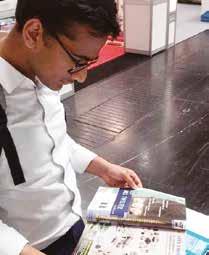
Wire Düsseldorf will open again from April 15 to 19 in 2024 at Convention Center Düsseldorf.





Like with Osaka and Nagoya, M-Tech Tokyo as a barometer of the Japanese fastener industry attracted twice the number of exhibitors at the time when the Japanese government had loosened up border control. People were flowing back to the venue and visitors as well as exhibitors were in their masks having business talks, following the show’s regulations. Our staff on-site found a potential trend and an opportunity in the talks with visitors.
Most of the visitors to the Fastener World booth were key directors and managers, most of whom from the purchasing department. This reveals that Japan’ s purchasing demand has been increasing in recent years regardless of the macro-environment. It involves a cause as well as a concern.




 by Dean Tseng, Fastener World
by Dean Tseng, Fastener World
Our staff on-site asked the visitors why they came for the latest publications. Many of them spoke of a bottleneck they had in common —— cost pressure. “ Price is hiking so much in Japan that I have to reach out to price-competitive sources of supply. I know Taiwan has quality fasteners so I’m curious about the industry structure of Taiwanese fasteners, and whether there are any Taiwanese fastener suppliers able to collaborate ASAP,” said one Japanese visitor. The words hint at a large room for Taiwanese fastener industry to develop the Japanese market. Taiwanese business owners need a full-range international sales expansion and marketing to get the Japanese owners to know Taiwanese fasteners.
Previously we reported on Fastener World official website that the Russia-Ukraine war took a toll on the Japanese fastener industry that directly affected cost. It spiked up cost of materials including steel and aluminum, as well as the invisible costs for what the Japanese referred to as “sub-materials”, including surface treatment and packaging, which they would rarely pass on to clients. According to the Japanese press, the last two years already saw some small and medium enterprises close up, and the Japanese government has introduced subsidies for them to rebuild business and pull through.
To the Japanese visitors, Fastener World presented 5 series of publications containing companies intelligence. Some of them told us they actually came straight for our magazines. We met Japanese vendors with different specialties including construction, ship component trading, special steel manufacturing, automotive fastener production, fastener distribution and manufacture, and they were all asking which companies in Taiwan could supply fasteners. We have updated this information with related suppliers.
The next M-Tech Tokyo will be back on June 21 to 23, 2023.










The annually held Fastener Fair USA returned to Detroit with a physical event held on May 17-19 at Huntington Place. Being a professional tradeshow dedicated to the whole fastener supply chain (incl. manufacturers, distributors, equipment fabricators, mechanical & design engineers, processors, purchasers, distributors, OEM, packaging service providers, and end-users), the event this year attracted the attendance of professionals from automotive, aerospace, construction, furniture, electronic appliances, and many other industry sectors to look for the latest fasteners and learn about relevant industrial trends and market development intelligence.
123 exhibitors from various countries came to showcase their industrial fasteners and fixings, construction fixings, assembly and installation systems, fastener manufacturing technology, storage, distribution, factory equipment services (coating/packaging...), information and communication. In addition, several well-known specialists from within the industry were also invited to give thematic sessions on relevant fastener technology, logistics, electroplating, etc. and associations also gave their own activities for further interaction. This tradeshow provided the best opportunity and platform for all participants to meet each other, strengthen collaboration, and deepen multilateral interaction.
The worldly known marketing press dedicated to the fastener and hardware industries, Fastener World Inc., which booked a booth this year, also made the most of this opportunity to conduct deep communication with local buyers, simultaneously share with the world the latest industrial intelligence through our multiple publications (incl. Fastener World, China Fastener World, Hardware & Fastener Components, Emerging Fastener Markets, etc.), and introduce superior suppliers of products, equipment, and relevant service from the world to local potential purchasers. Other Taiwanese exhibitors this year also included BBI and Angelray.
According to the observation of our staff on-site, although the number of visitors to Fastener Fair USA this year was not as many as observed in the last few editions due to reasons like pandemic control measures and travel restrictions, most buyers and visitors coming to Fastener World’s booth were from relevant industries and fields. As a result, we could ensure that all printed copies brought to the show were handed out to buyers with significant demand. The high demand for Fastener World publications at the show also revealed our long-term leading position in the global fastener industry and the fact that we were doing whatever we could to create opportunities for our advertisers to gain more exposure at every important international tradeshow.




According to the organizer of Fastener Fair USA, the next edition will be relocated to Music City Center, Nashville, TN on May 16-17, 2023.



Dual Y Axis Automated Screw Fastening Platform by PDT (Taiwan) improves operation efficiency and cuts down the cost for labor. The platform comprises a work section on the left and another on the right side. Upon completing operation on the left section, the platform would automatically switch to the right section to continue operation, while the left section is already on standby for the operator to feed materials. When the operator finishes feeding and pushes the “production-ready” button, the left section will automatically start production as soon as the right section finishes production. This alternating operation flow keeps the platform running 24-7 and makes for a solution for factory upgrade and transformation towards automation and labor reduction. (Image Source: Commercial Times, Taiwan)
Dual Y Axis Auto Screw Fastening Platform 雙Y軸自動鎖螺絲平台
excellent corrosion resistance and long-lasting aesthetics for a variety of inland exterior projects.
“CAMO is excited to offer a full line of Stainless Steel screws and nails for contractors to add value and performance to their upcoming projects,” said Doug Hutchings, Vice President of Product Development at National Nail. “The variety of Stainless Steel fasteners deliver superior corrosion resistance and holding power on any jobsite, even in the harshest coastal conditions.” Hutchings added that the unique Stainless Steel Fastener pails with metallic lids is the first in a series of visually bold, new CAMO packaging that will ultimately be rolling out to all CAMO products. Other brand colors like CAMO’s distinct orange is designed with the end-consumer in mind for easier selection.

National Nail’s CAMO® brand of tools and fasteners has introduced new CAMO Stainless Steel fasteners to help contractors, remodelers and DIYers build better in every environment. Now, the CAMO brand can add fastening efficiency and strength to exterior projects across the country, no matter the environment. Designed to protect connections against the elements, CAMO’s 316 Marine Grade Stainless Steel fasteners are ideal for use in highly corrosive coastal and agricultural environments and applications that face abrasive agents. CAMO 305 Stainless Steel fasteners provide
Perfect for building wood or composite decks and other exterior projects, CAMO’s new line of Stainless Steel fasteners includes hand drive deck, composite and trim screws that come with a 2 in. (50.8 mm) power bit for jobsite convenience. They also offer 316 Stainless Steel Marine Grade Edge Screws for use with CAMO MARKSMAN Pro® tools and collated screws for use with the CAMO DRIVE™ standup tool. New to the CAMO brand are ring shank deck nails and joist hanger nails as well as collated ring shank framing nails and collated metal hanger nails that are compatible with a wide array of pneumatic nailers. Just like other CAMO tools and fasteners, CAMO backs up their line of Stainless Steel screws and nails with a warranty to resist rust and corrosion.

Tohnichi
developed
Series Wireless Torque Wrench utilizing HOGP Bluetooth data transmission.

the press of a button, the measured values will be input in a business form to efficiently and correctly record torque values and angles. Besides, it can detect duplicate fastenings to prevent human errors. When the torque value or angle exceeds the threshold, an error will appear on the business form to improve check
needs
Excel to generate the business


Tap” developed by Yamashina (Japan) can greatly reduce chips when it taps iron and other plates. Using tapping screws on circuit boards can generate chips that fall on electric wires and cause a short circuit; therefore, electronic parts have to limit the use of tapping screws despite the need to save costs.
To reduce chips, the self-tapping screws would have to be applied with adhesives, or the fastened object has to be attached with a device to capture chips. Doing so would increase costs. To tackle this, Yamashina analyzed the generation of chips as well as their constituents, and succeeded in developing a self-tapping screw with a brand-new shape that can be used on EVs, drones, robots and circuit boards.
Although stainless steel is less likely to rust than other metals do, it could actually rust from oil, iron, scales and other impurities attached to it in the manufacturing of fasteners. SS Coat’s heat treatment pushes the inherent characteristics of stainless steel to the limit.
SS Coat (Japan) recently introduced a coating technology named SABINAI JYAN. This black-dyeing surface treatment is often said to have inferior corrosion resistance. However, SABINAI JYAN passed over 3,000 hours in an anti-corrosion test. It is suited for use with outdoor black materials and SUS410, SUSXM-7, SUS304, SUS305, SUS430 materials, and it
use Chromium-based chemical solutions.






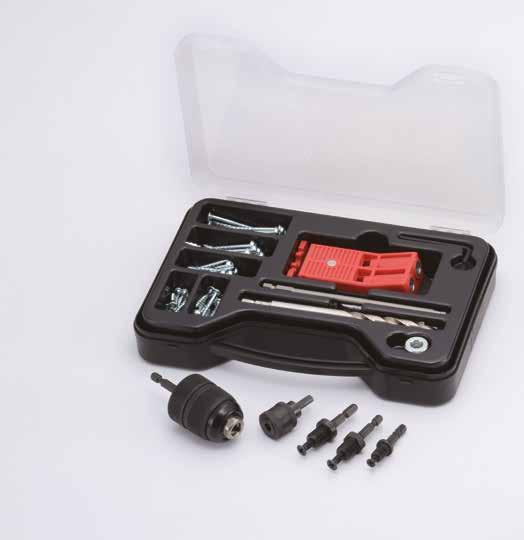







The fixing specialist fischer offers the new TermoZ CS II screw fixing to anchor ETICS insulation panels made of any kind of material including fire bars into any conventional construction material. This enables simple, time-saving screw mounting with minimal thermal bridges.
Considerable efforts must be made in the building sector in order to attain climate goals by 2030. There is still tremendous potential for saving energy that lies dormant in existing buildings. Facade insulation is a highly effective measure to increase energy efficiency in this regard. But in order to be able to fulfil their function, external thermal insulation composite systems (ETICS) must be professionally installed. Securely anchoring the insulating layer in the anchor substrate with as few thermal bridges as possible is of key importance. The new fischer TermoZ CS II fixing is made for this task.
The latest addition to fischer’s range of ETICS fastenings is multitalented, as it is suitable for fastening insulating panels in any conventional material and thickness on all standard solid and hollow construction materials. The ETICS fixing therefore doesn’t need to be replaced if the facade is equipped with various insulating materials such as a fire bar, which saves additional time. Its approval for every building material class (A, B, C, D, E) guarantees its secure application. fischer’s TermoZ CS II is therefore also suitable for subsequent insulation on renovated buildings if there is uncertainty about their anchor substrate. Further advantages include the fact that any improper use caused by unsuitable insulation fixings is prevented and users can make do with a single ETICS fixing even if the building has various substrates. The European Technical Assessment (ETA-14/0372) regulates the use of the TermoZ CS II in concrete, masonry (solid and perforated brick), lightweight aggregate concrete and aerated concrete. Thanks to its anchor sleeve with a symmetric expansion zone, the newcomer is the first insulation fixing with an approval for hammer-drilled holes in vertically perforated bricks. The special geometry below the plate (Fibonacci) reduces the required insertion torque for convenient and fast installation. Its upper side features a specialist surface structure for better adhesion to plaster. The closed plate does not allow any dirt to be ejected, providing a clean setting result.
With its new TermoZ CS II screw fixing, fischer offers system providers a universal insulation fixing that hardly, if at all, impairs the energy efficiency of ETICS and also enables efficient work and rapid construction progress.











The EU Construction Products Directive published in 2013 requires the use of stainless steel fasteners in exposed part of buildings which are expected to last for over 25 years. Earlier, construction fasteners were mostly in carbon steel and they can finish drilling, threading fixating and fastening in one process. While this saves time, it jeopardizes building safety due to long exposure and corrosion.
MIRDC (Metal Industries Research & Development Centre, Taiwan) said lots of construction fasteners sold on the market are bi-metal self-drilling screws comprising carbon steel and stainless steel, possessing the hardness of carbon steel and corrosion resistance of stainless steel. However, they have a complicated processing procedure, and could potentially break apart on the welded spot or be corroded on the carbon steel section.
MIRDC developed a surface treating machine to handle anti-corrosion and surface hardening treatment for stainless steel parts, providing solutions to deficient stainless steel hardness, weakened corrosion resistance and inability of mass-production. The machine can make for a stainless steel surface hardness up to over HV1,200 (

much higher than with carbon steel) without undermining corrosion resistance.
Furthermore, the machine can process a large number of stainless steel parts at a time. It can also handle complicated shapes and form an evenly hardened layer at the parts’ surface. It uses AI for precise control of temperature, time and other parameters. Meanwhile, MIRDC provides IoT solutions tailored to production lines to facilitate smart manufacturing.
Böllhoff has developed the RIVKLE® Seal Ring range of blind rivet nuts and studs with integrated and captive sealing function for battery pack applications. The resulting assembly is robust and fluid tight; the entire range meets the most stringent sealing quality requirements (ISO 20653 IPX7) and automotive quality requirements.

In combination with Böllhoff’s automatic setting tools, the RIVKLE® solution is optimised in terms of cost and speed of installation, with an unprecedented level of validation of the quality of the implemented product (process control).
This global approach also allows optimal machine availability, thanks to both a high autonomy of the machines (automatic function “2nd try” with replacement of the RIVKLE®) and reduced frequencies and periods of maintenance (optimized TCO).
As the speed of technology and trends in consumer behaviour accelerates, companies around the world are evolving quickly and TR Fastenings is no exception. TR’s latest product launch of Compression Limiters has been developed to meet the growing global demand from multisector manufacturers developing products using plastics, particularly in the EV space.
Compression Limiters reduce the stress that’s generated by traditional threaded fasteners. Demand has mainly been driven by the automotive sector, and applications in the energy and general industrial sectors where high load bearing plastic components are used and have also contributed to the surge in worldwide demand.


Compression Limiters are used extensively in composites and plastic mouldings as through holes help reduce the stress generated by conventional fasteners. These non-threaded inserts are commonly used in applications where a compressive load is applied to a plastic assembly to prevent the integrity of the plastic from being compromised.

These products are used extensively in electric vehicles and the battery housings. As technological advances continue, so does the need to continually develop the primary components that make up an electric vehicle. Newly created giga factories and battery housings manufacturers in Europe, Asia and North America will be looking to include these products in many upcoming automotive research and development projects and with a global presence, TR Fastenings is ideally positioned to meet this demand, whilst also providing technical and design assistance.
TR’s experience over the last few years is that many of these are designed in specials and required in high volume. There are a number of different types and as a guide the TR’s Compression Limiter range consists of symmetrical, flanged, split seam and oval manufactured from steel, stainless, brass and aluminium.


Smart Expansion Anchor

After Sanko Techno launched sales of its expansion anchors back in October 2020, customers had hoped for an expansion anchor that can be used in tunnel construction. Therefore, the company developed “Smart Expansion Anchor”. With a shorter embedding length, the new anchor expands and cuts the wall as it is drilled into the hole with a small hammer drill, so the operator can quickly complete the work even when the anchor is drilled upwards. Using anti-loosening nut with the anchor can prevent deterioration in the gap between the anchor and the hole.
“Smart Expansion Anchor” is available in 3 sizes including M8, M10 and M12, and in two material types including steel and stainless steel. It launched sales on March 1, and is expected to bring a total revenue of JPY 15 million this year.




Malaysia is geographically advantageous with its location on the center of southeast Asia, adjacent to Thailand to the north, and near Indonesia to the southwest across the Strait of Malacca which is an important marine route in the world that makes Malaysia the central hub of southeast Asia. Malaysia generated around USD 322.5 billion GDP, USD 238.32 billion total import value and USD 2992.9 total export value in 2021. The metal products which include fastening tools are one of the top tradedcategories in Malaysia.
In 2021 Malaysia imported USD 18.15 billion worth of fastening tools from Taiwan, up 32.3% over the same period in 2020, making Taiwan the 3th largest import source for Malaysia. In 2021 Malaysia exported USD 9.79 billion worth of fastening tools to Taiwan, up 21.4%, making Taiwan the 9th largest export market for Malaysia. The bilateral trading value between the two countries was around USD 27.94 billion, so Taiwan is the 10th largest trade partner for Malaysia. The U.S.-China trade war has impacted global trade in recent years. The American and European countries redirect orders and it has changed the global fastening tool trade market. Additionally, many of those orders are redirected to southeast Asia. This article will analyze this change and offer a corresponding measure.
 by Dr. Arthur Hsu
by Dr. Arthur Hsu
Table 1 shows the trend in ASEAN’s fastening tool import from the world. The top 3 ASEAN countries with the most imported fastening tools were Indonesia (NTD 6.02 billion), Thailand (NTD 5.77 billion), and Malaysia (NTD 4.82 billion). Although the import values do not necessarily translate to the amount of demand, it is still necessary to consider Malaysia’s capacity. Import reflects a rough picture of Malaysia’s demand for fastening tools. Except for other primary ASEAN countries like Singapore and Philippines with a negative growth in importing fastening tools, Malaysia had a CAGR of 11.3% in importing fastening tools, topping all other ASEAN countries.
Unit: USD 100 Million; %
2017 2018 2019 2020 2021 CAGR
Indonesia 1.73 2.13 2.12 1.73 2.15 5.5%
Thailand 1.80 2.03 2.19 1.69 2.06 3.4%
Malaysia 1.12 1.15 1.33 1.30 1.72 11.3%
Singapore 1.62 1.72 1.55 1.29 1.49 -2.2%
Vietnam 0.84 0.85 0.92 0.90 0.97 3.6%
Philippines 0.84 0.93 0.83 0.52 0.70 -4.3%
Total 7.12 7.89 8.12 6.90 8.39 4.2%
Source: ITC/MIRDC

Table 2 shows the trend in ASEAN’s fastening tool export to the world. The top 3 ASEAN countries with the most exported fastening tools were Vietnam (NTD 9.22 billion), Malaysia (NTD 6.02 billion), and Singapore (NTD 4.68 billion). The U.S.-China trade war has impacted global trade in recent years. Some of the Chinese companies are looking out at southeast Asian countries like Vietnam where they can evade tariff. They buy land to build factories there and hope to veer from the tariff impact brought by the U.S.-China trade war. Therefore, Vietnam nudged Malaysia off the top place, and took over as the largest fastening tool exporter in 2021 with an astounding 647% growth rate over 2020. Additionally, Although Thailand and Indonesia had a higher CAGR of fastening tool export compared to Malaysia, their export values were small and so were their influences, but it is still worth tracking their trends.
Unit: USD 100 Million; %
2017 2018 2019 2020 2021 CAGR
Vietnam 0.38 0.46 0.51 0.44 3.29 71.5%
Malaysia 1.86 1.85 1.57 1.47 2.15 3.7%
Singapore 1.79 2.16 1.63 1.42 1.67 -1.7%
Thailand 0.44 0.50 0.57 0.53 0.77 14.9%
Indonesia 0.05 0.03 0.03 0.07 0.12 24.8%
Philippines 0.02 0.02 0.02 0.03 0.04 18.2%
Total 4.52 4.99 4.31 3.93 8.00 15.4%
Source: ITC/MIRDC
Table 3 shows the trend in Malaysia’s fastening tool trade with the world and Taiwan. In 2021, Malaysia imported USD 172 million worth of fastening tools from the world, with a 5-year CAGR of 11.3%, and exported USD 215 million worth of fastening tools to the world with a 5-year CAGR of 3.7%. Between Taiwan and Malaysia, from 2017 to 2021 Taiwan’s fastening tool export to Malaysia slipped from USD 8 million to 6 million, with a CAGR of minus 8.8%, which indicated Taiwan’s fastening tool market share in Malaysia was weakening.
Table 3. Malaysia’s Fastening Tool Import & Export with the World and Taiwan Unit: USD 100 Million; %
Product Category 2017 2018 2019 2020 2021 CAGR
Value of Malaysia
Value of Malaysia
Value Malaysia
s Fastening Tool Import from the World
s Fastening Tool Export to the World
s Fastening Tool Import from Taiwan
Value of Malaysia
s Fastening Tool Export to Taiwan
1.15 1.33 1.30 1.72 11.3%
1.85 1.57 1.47 2.15 3.7%
0.08 0.07 0.05 0.06 -8.8%
0.01 0.01
Unit: USD 100 Million; %
shows the top fastening tool trade partners for Malaysia. In terms of import, the top 3 sources of import were China (USD 122 million; taking up 70.87%), USA (USD 13 million; 7.83%), Japan (NTD 7 million; 4.05%), and Taiwan (USD 6 million; 3.34%). China alone took up 70% of import and the top 10 sources of import took up over 90%, resulting in a highly concentrated market. In terms of export, the top 3 destinations of export were Germany (USD 36 million; taking up 16.75%), Hungary (USD 24 million; 11.30%), and USA (NTD 24 million; 11.0%). Germany as the top export destination took up 16.75% of export, and the top 10 destinations of export took up nearly 80%, also resulting in a highly concentrated market, but the proportion of the top ten export destinations was small. Malaysia doesn’t export a large amount of fastening tools and it doesn’t go as far as to affect Taiwan.
Table
China 1.22 70.87% Germany 0.36 16.75%
U.S.A. 0.13 7.83% Hungary 0.24 11.30%
Japan 0.07 4.05% U.S.A. 0.24 11.00%
Taiwan 0.06 3.34% China 0.22 10.07%
Singapore 0.04 2.42% Slovenia 0.13 5.95%
Germany 0.03 1.90% S. Korea 0.12 5.81%
Thailand 0.02 1.19% Singapore 0.12 5.48%
Brunei 0.02 1.08% Netherlands 0.09 4.36%
Belgium 0.02 0.98% Japan 0.08 3.81%
India 0.02 0.97% Brazil 0.06 2.82%
Sub-total 1.63 94.61% Sub-total 1.66 77.34%
Total 1.72 s Total 2.15 100.00%
Source: ITC/MIRDC

Table 5 shows the trend in Malaysia’s fastening tool import from the world. The values and CAGRs of Malaysia’s import of top 3 fastening tool categories from the world were: electric socket wrenches (USD 57 million; 10.3%), emission nailers (USD 38.99 million; 12.1%), and drilling/thread-cutting/thread-tapping tools (USD 14.38 million; 59.9%). The 5-year CAGRs of the top 3 imported fastening tool categories all exceeded 10%, indicating Malaysia’s stable demand for fastening tools. The top 3 imported fastening tool categories with the highest CAGR were: drilling/thread-cutting/thread-tapping tools (59.9%), hammers and sledge hammers (30.6%), and screwdrivers (30.1%). Despite with a small import value, these categories could be a potential market to fill Malaysia’s demand for fastening tools.
Electric socket wrenches
Emission nailers
Unit: USD 10 Thousand; %
2017 2018 2019 2020 2021 CAGR
3,853.5 3,128.7 3,834.5 3,076.1 5700.3 10.3%
2,465.5 2,777.9 3,406.7 3,421.4 3899.5 12.1%
Drilling, thread-cutting and thread-tapping tools 220.1 285.9 582.1 2,016.5 1438.6 59.9%
Screwdrivers 418.9 825.3 1,032.2 949.2 1200.4 30.1%
Hammers and sledge hammers 360.1 494.4 783.2 539.7 1049.2 30.6%
Pliers, clamps and the like 1,209.8 1,126.4 916.5 538.6 795.9 -9.9%
Pliers, pincers, tweezers and similar tools 656.9 612.9 572.5 422.8 711.2 2.0%
Unadjustable hand-operated wrenches and spanners 518.8 582.6 535.5 443.0 677.1 6.9%
Adjustable hand-operated wrenches and spanners 322.9 426.1 391.5 284.1 646.3 18.9%
Portable pneumatic wrenches and spanners 514.6 528.4 552.0 492.9 537.4 1.1%
Interchangeable wrenches and sockets with or without handles 406.0 444.6 499.5 604.0 379.6 -1.7%
Bolt croppers and similar tools 273.6 272.3 212.6 168.8 210.0 -6.4%
Total 11,220.7 11,505.5 13,318.8 12,957.1 17,245.5 11.3%
Source: ITC/MIRDC
Table 6 shows the trend in Malaysia’s export to the world. The values and CAGRs of Malaysia’s export of top 3 fastening tool categories to the world were: electric socket wrenches (USD 203 million; 5.0%), emission nailers (USD 7.23 million; -12.3%), and pliers/pincers/tweezers/similar tools (USD 1.43 million; -14.9%). With a stable growth rate and export competitiveness, electric socket wrenches as the top exported category had an export value far above emission nailers at the second place. The 5-year CAGRs of the top 3 exported fastening tool categories were: pliers/pincers/tweezers/similar tools (43.1%), screwdrivers (37.2%), and portable pneumatic wrenches and spanners (32.2%). Despite with a small export value, high CAGRs could mean these Malaysian product categories have improved quality and capacity as well as a stable demand from clients and this is worth ongoing attention.
Table 6. Malaysia’s Fastening Tool Export to the World by Category
Product Category
socket wrenches
nailers
Pliers, clamps and the like
Unadjustable hand-operated wrenches
USD 10 Thousand; %
2020 2021 CAGR
5.0%
-12.3%
-14.9%
-1.7%


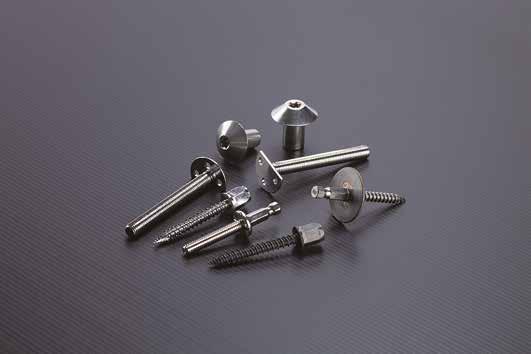







In terms of foreign investment, the top 3 sources of foreign investment for the Malaysian manufacturing sector were: China (USD 4.405 billion), Singapore (USD 2.192 billion), and the Netherlands (USD 1.622 billion), covering fields including machinery/components, automobiles, metal products, electrical and electronic engineering. Regarding local Taiwanese companies, by the end of 2021, they invested USD 13.821 billion in Malaysia. Taiwan is the 8th largest investor for Malaysia, mainly investing in rubber, petrochemical, food producing, traffic equipment, furniture/accessories, electrical and electronic engineered products, forged metal products, wooden products and machinery industries.
Malaysia announced its national traffic policy (2019-2030) in 2019, and planned to become the distribution hub in southeast Asia, encouraging the development logistics in cities to meet the demand for logistics required for e-commerce. Malaysia arranges for a digital free trade zone for Kuala Lumpur International Airport as a development center for aerospace service, and establishes repair and maintenance service. Additionally, Malaysia announced the national industry 4.0 policy which focuses on 12 potential areas including electrical and electronic engineering, machinery, chemical, medical, aerospace, automotive, transportation, textile, medicine making, metal, food processing and the service sector. Malaysia’s infrastructure and policy planning cohere with the domestic construction industry which has an annual production value of NTD 400 billion, so this country has quite substantial potential demand for fastening tools.
Malaysia will be a part of the worlds largest free trade agreement with RCEP signed in March 2020. This will help the country benefit from the cancellation of around 90% tariffs among member countries and increase USD 200 million income from export. The agreement eliminates non-tariff barriers, improves trade convenience and helps Malaysia improve the commercial environment. It will up the barrier on non-RCEP countries with an interest in tapping into the Malaysian market, but will also attract other countries to increase interest in setting up factories in Malaysia. When the free trade agreement takes effect, it could affect the ranking of fastening tool export in ASEAN.

























There is a gap in the industrial level between Malaysia and Taiwan. For long, Taiwan has been exporting fastening tools mainly to the U.S. and Europe. Malaysia is yet to affect Taiwan’s global competitiveness in the short term. From a broader perspective on Malaysia’s future national and industrial development, below is my advice for Taiwanese business owners in Malaysia:



1. Extending Taiwanese market: Taiwanese business owners are advised to observe RCEP’s efficacy with investing in Malaysia, and evaluate whether Malaysia is suited to be a production base for exporting processed products. They can use bilateral industry-level investment and trade to extend the Taiwanese market to Malaysia and create favorable conditions for expanding export.


2. Enhancing Taiwanese companies’ clustering and deployment in Malaysia: Taiwan could build a strategic investment partnership with Malaysia and set up an investment collaboration platform. Taiwanese companies are scattered in Johor, Selangor, Perak, Melaka, Kedah and Sabah. Taiwan can take the lead and work through Taiwanese commercial organizations in Malay sia to build a cluster for Taiwanese companies and enhance the local supply chain and support system, set up Taiwanese contacts to connect to Malaysian resources, and enhance Taiwanese industry connections.
3. Pre-investment evaluation: Taiwanese companies should have strategies to evaluate the risks of investment in Malaysia. Malaysia has set regulations regarding environmental impact assessment for investment in the steel and nonferrous metal industries. In terms of fastening tools, any part of the manufacturing process which involves pickling and degreasing, coating and electroplating could potentially pollute the environment. Therefore, Taiwanese companies should make a prudent assessment on investment in Malaysia.

4. Labor issues and regulations: Malaysia doesn’t have sufficient high-end talents of science and engineering specialties; and therefore, it allows the manufacturing and export-oriented industries to employ foreign labors, with mandatory collection of poll tax. Plus, the Malaysian government regulates that labor-intensive industries paying each labor for less than MYR 55,000 in an investment are restrained from acquiring manufacturing permits and cash incentives for investment. This is not preferable for Taiwanese fastening tool companies seeking low-cost labors.















Chen International
63.56
Commonwealth Magazine
by Fastener
Ming Enterprise 132.36 44.32 14.43 10.90
Yu Works 118.10
6.31
107.00 34.93 4.26 3.98
International 101.93 15.51 3.76 3.69
Tycoons Worldwide Group (Thailand) 75.20 30.83 3.13 4.16
Boltun 71.72 48.34 3.49 4.87
Shing Fastech 71.07 40.09
13.83
Chu Shin Yee 43.74 45.17 3.96 9.05
37.61 105.97 1.30 3.46
Her Enterprise 36.33 23.78
Hwei
527 469
514
738 635
1021 1289
754


International
Fu
16.68
Top 2,000
Steel Corporation
Dragon Steel Corporation
Hung Steel Corporation
Best Wire
Tai Metal Industrial
Quintain Steel
Yuang Hsian Metal
62.04
13.25
13.88
11.82
Among Top 2,000
Manufacturers
15.55
51.41
Nan Iron Wire 18.15 -0.55
Zu Machinery
3.27
16.06
7.22
5.75
Among Top 2,000
Manufacturers
Chiro










The global sales of hand tools are expected to rise at a CAGR of 5.9% in next 10 years. East Asia and South Asia Pacific are the leading shareholders in the market due to massive labour force and applications of hand tools on field used by their workers. Europe and North America have high share in the global hand tools market as well. As reported by Future Market Insights overall Asia Pacific is expected to hold a collective revenue share of 35% in the global market, by the end of 2032. The global sales of hand tools are projected to reach over USD15 billion by the end of this year with a stable long-term growth.
The increase of do-it-yourself (DIY) activities globally has a significant impact on the hand tools market. Within the last two years the production of DIY tools increased as a result of the pandemic. The growth of hand tools’ usage in the commercial end-use sector is the key driver for the demand of most of hand tools such as hammers, spanners, cutters, screw drivers, wrenches and other hand tools. The demand is forecast to rise as application in repair and maintenance work consistently grows. While the sales of hand tools like wrenches are expected to account for maximum demand supported by their vast applications by professional builders and craftsmen in the construction industry, the cost-effective product development of specific tools with advanced machinery is predicted to boost the market across diverse regions.
The hand tools market is fragmented as there are several players in the market split by type and by application. However, key players in the market own about 40% to 50% of the market share. These players main ly embrace new technologies and invest more in development of their distribution channels to maintain their market presence. Development of sales network and distribution channels significantly boost the market. To attract new sales channels in the reselling sector, manufacturers offer franchise stores with attractive benefits to the owners. Moderately Low capex with the comprehensive support from the manufacturers in terms of the operation, technical and sales are the key success factors for the resellers to set up and run their businesses in the hand tools market.
East Asia is projected to record distinguished development in the global hand tools market within the next ten years. The market development is largely due to high demand for industrial and professional tools in this region. Moreover, the increasing number of local manufacturers in the market is leading to a healthy competitive landscape, supporting the market growth while the presence of a large number of well-established brands in the region keeps growing.
Other than DIY tools, the demand in the hand tools mar ket is mainly driven by the needs of other industrial com panies, and to a lesser extent by consumer spending. In the region, the profitability of hand tools manufacturers depends on technical expertise and efficiency of operations. Large companies have economies of scale in purchasing raw mate rials. The specialized nature and use of many products allow smaller companies to compete effectively.
In the region, China, Taiwan and Japan are the leaders in terms of the production of hand tools products. China and Taiwan are not only key exporters regionally, but also they are the top players in the global hand tools market. Japan and Korea are in the list of global exporters but way behind those two leaders. China owns the majority of the market shares as some of their products own almost half of the global exports market.
Hand-operated spanners and wrenches are fast growing products in this market. In 2021, China exported about USD1.2 billion of the products (HS Code 8204) to the global market. The total value of exports last year was about USD3.7 billion, i.e., more than 30% of total exports value comes from China. Taiwan, the second largest exporter of hand operated spanners and wrenches, shipped more than USD809 million to other countries within the same year. Both countries, in total, have







Exports Value (USD million)
China Taiwan Germany USA India
2017 835
China Taiwan Germany USA India
2017 835.1 589.6
941.7 631.4
943
971
1,184
651
Exports Value (USD million)
129.7
137.1
140
the value of exports slightly lower than USD2 billion which is about 55% of total exports value globally.
4,000
3,000.00 3,500
3,500
3,000
2,500
2,500
2,000
1,500
1,000
2017 2018 2019 2020 2021
China 2,316 49 2,616 44 2,886 76 3,000 42 3,729 16
Taiwan 991 22 1,006
697 83
578
France 263
966
952
1,262 13
843
579
264
the total export values of hand-operated spanners and wrenches within the
five years.
1
As stated above, the first two exporters, China and Taiwan, own more than 50% of the market shares. The figure is a good exam ple to support East Asia as a market leader in the hand tools market.
There is another category of hand tools relevant to the fasteners under the HS Code 8205. This category of tools is again led by China and Taiwan. Both countries sold almost USD5 billion of hand tools in 2021 within the same cat egory of products to their interna tional clients. This amount is more than half of the total exports value in last year. The major destinations of the products are the US, Germany, UK, Russia, Canada, Australia and the Netherlands. Chart 2 shows the export values of this category of hand tools within the last five years.
In terms of the imports, for some of the hand tools China is still one of the major destinations in the global market, however, the value of imports by Chinese market is considerably smaller than its value of exports. In 2021, China imported about USD141 million of handoperated spanners and wrenches and was ranked as the fifth largest importers in the global market. However, in other types of hand tools China has imported smaller amount of products compared with other players in the market. Table 1 shows the ranking of China, Taiwan and two other East Asian countries in the hand tools market more specifically for hand tools categorised under HS Code 8205. Table 1 is based on the trade values in 2021.
summary, in today’s market, hardware and tools manufacturers have a better understanding of the importance of design in their productions. Adding new and innovative features in their tools help them capture greater market share. The players in the market have learnt that their tools must be robust, deliver consistent and reliable performance
designed in a way that they cater to the requirements of the selected applications.



Japan 946,148
China 3,113,185 19,933,191 2,104,920 10,344,092
12,421,349
13,832,709
USA 129,876 15,381,238 56,237 8,277,703 85,327 10,659,840 56,541 11,080,190
Singapore 244,198 12,057,981 185,543 7,281,850 139,075 4,659,930 123,731 4,606,429
S. Korea 230,558 3,741,535 150,779 2,278,614 92,962 2,235,667 92,038 3,291,098
Taiwan 417,217 4,985,750 154,743 2,126,433 117,887 2,832,155 113,184 3,193,410
Malaysia 71,313 2,519,916 33,696 1,556,782 40,454 1,649,448 146,522 2,334,939
Indonesia 1,218 92,379 4,045 155,395 38,481 337,236 210,525 1,913,522
Germany 58,277 3,345,020 39,829 2,778,842 30,865 1,588,775 47,710 1,885,688
Thailand 120,501 1,586,066 144,517 1,500,476 22,648 1,165,604 81,319 1,791,296
World 560,819 6,969,114 237,737 3,745,606 106,580 2,313,266 273,093 4,264,043
Japan 178,248 1,531,423 7,485 757,069 4,082 369,784 61,938 1,022,744
Australia 7,909 342,197 24,403 162,194 32,783 344,528 44,999 928,935
Indonesia 2,882 22,265 10,230 227,282 5,583 283,642 84,477 824,578
S. Korea 17,288 129,114 3,537 378,741 662 94,022 8,455 422,194
Thailand 379 38,254 2,725 23,886 27,003 43,349 5,828 349,668
Malaysia 121 14,399 13,673 81,918 111 232,023 134 106,261
7 China 1,821 25,372 80,285 1,040,457 948 166,821 743 92,998
8 Vietnam 717 2,827 1,092 24,817 9,447 28,926 14,275 85,663
Hong Kong 146 13,161 23,777 163,266 9,231 388,471 49,384 79,512
Taiwan 19,159 129,859 8,765 308,155 611 15,174 169 71,406
World 21,856,892 42,737,798 20,934,236 39,577,811 11,417,569 22,253,361 10,742,262 26,070,184
China 18,640,461 18,093,098 17,534,745 19,893,765 9,972,771 11,015,801 8,252,555 8,365,747
Japan 596,609 6,064,413
2,836,870
197,859 2,918,104 86,508 1,596,172
Rank Partner 2018 2019 2020 2021
Quantity Value
World 182,880 1,443,698 745,050 1,922,378 132,166 1,474,911 293,800 2,759,931
Australia 39 2,043 2,059 29,600 7 5,577 71,000 1,269,210
Japan 91,120 1,023,361 114,582 1,285,715 72,717 946,769 58,143 887,148
USA 68,673 234,257 93,511 358,621 35,897 271,305 129,464 253,428
21,517 2,484 13,502 5,608 39,178 21,852 160,843
5,413 12,805 87,344 5,558 67,117
21,623
11,841 3,506 39,747
17,902
13,526

4,252.0
3,592.5


646.4
1,086.9 841.4 1,484.125 vs. 1,232.569
15,617.2 5,194.2 1,816.6 1,641.0 1,689.2 28,197.6 vs. 23,566.3

13,057.7 4,405.4 1,424.9 1,219.8 1,233.8

+27.4 +34.5 +36.9
3,243.224 1,333.515 301.769 288.379 216.907 2,462.115 vs. 2,382.430

3,192.399 1,343.322 350.740 334.250 251.117
7,491 vs. 7,145



2022 vs. 2021 Total Assets
2021 7,320 491 506 340
Change (%) +8.5 +49.2 +49.9 +48.2
Prospect for 2023 8,600 790 810 560
2022 7,940 733 759 505 14,314 vs. 13,515
Change (%) +8.3 +7.8 +6.7 +10.8
2021 5,307 263 300 186
Change (%) +14.9 +45.4 +30.4 +20.9
Prospect for 2023 6,570 470 490 290
2022 6,099 383 391 224 8,307 vs. 8,336
Change (%) +7.7 +22.5 +25.1 +29.0
2021 608.331 88,464 62,684 62,018
Change (%) +21.5 +3.7 +4.2 +4.4
Prospect for 2023 740,000 85,000 59,000
2022 739,260 91,728 65,337 64,770 1,007,497 vs. 812,878
Change (%) +0.1 -7.3 --- -8.9

2021 8,100 1,512 1,712 1,214
Change (%) +17.6 +39.6 +25.9 +25.4

2022 9,524 2,111 2,156 1,522 17,874 vs. 16,936
Prospect for 2023 9,690 2,110 2,120 1,440 Change (%) +1.7 0.1 1.7 5.4
2021 104,388 8,396 8,950 5,639 Change (%) +20.9 +91.8 +80.3 +94.9
2022 126,156 16,105 16,141 10,989 209,757 vs. 200,112
Prospect for 2023 135,000 20,200 20,200 13,600 Change (%) +7.0 +25.4 +25.1 +23.8
2021 32,462 1,613 1,676 477 Change (%) +21.2 +88.5 +79.4 +327.2
2022 39,358 3,041 3,007 2,040 28,774 vs. 24,702
Prospect for 2023 43,500 3,300 3,270 2,100 Change (%) +10.5 + 8.5 + 8.7 + 2.9










